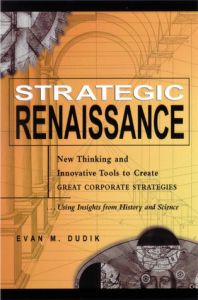Join getAbstract to access the summary!

Join getAbstract to access the summary!
Evan Matthew Dudik
Strategic Renaissance
New Thinking and Innovative Tools to Create Great Corporate Strategies
AMACOM, 2000
What's inside?
Here’s a revolutionary concept: Before buying into the latest management craze, how about some rigorous testing.
Recommendation
Evan Matthew Dudik says businesses do not select their strategies based on scientific thinking, but on anecdotal evidence. This trend has contributed to the explosion of new and changing ideas about what businesses should do. The resulting churn of activity is reflected in the many different approaches that books and consultants advocate. Dudik calls for a return to building and testing theories scientifically, arguing that no one-size-fits-all business strategy exists. Instead, managers should create and test hypotheses to determine an effective approach. Dudik also suggests applying effective warfare strategies and tactics to business. Overall, this is a fairly innovative, refreshing take on developing strategies, although presumably market research is set up to do some of this testing. Paradoxically, Dudik’s battlefield analogy seems like one more use of anecdotal evidence to bolster a theory. Generally, however, getAbstract.com recommends this thoughtful, helpful book, noting that its primary strength lies in explaining the use of scientific methodology to test business presumptions.
Summary
About the Author
Evan Matthew Dudik is the president of Evan M. Dudik & Associates, a consulting firm in Vancouver, Washington. He was a company president, a McKinsey and Co. consultant and a lobbyist. His articles on corporate strategy have appeared in The Wall Street Journal and The Journal of Business Strategy He received his M.B.A. from Harvard Business School and his Ph.D. from the University of Texas.
















Comment on this summary